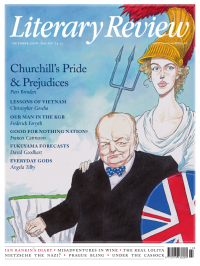Levi Roach
Oh What A Knight
King Arthur: The Making of the Legend
By Nicholas J Higham
Yale University Press 380pp £25
If Helen’s was the face that launched a thousand ships, Arthur’s is the name that has spawned a thousand theories. Scarcely a year passes without someone locating the ‘real’ site of Camelot or the decisive Battle of Badon Hill. In fact, just weeks ago Nick Knowles (of DIY SOS fame) reckoned he could prove that Camelot was at Cirencester. His grounds were that a fortified Roman amphitheatre there was taken by the Anglo-Saxons in the later sixth century and may have given rise to later tales of the Round Table.
Unfortunately for Knowles, neither Camelot nor the Round Table appears in early Arthurian texts. They first began to be associated with the legendary monarch over six hundred years after his supposed demise. Yet this case illustrates the secret of Arthur’s longevity: a lack of source material, which actively encourages speculation. In the Middle Ages, writers were already remoulding Arthur in their own images, a process that continues to this day. He has been a beacon of Welsh independence and a symbol of English imperialism, the last Roman and the first Briton. And it is surely only a matter of time before he starts being recast as an arch-Remainer and a diehard Brexiteer.
With so much wood, it is often hard to see the trees. For this reason, Nicholas Higham’s readable yet scholarly intervention is to be warmly welcomed. As the subtitle suggests, the book is concerned not so much with Arthur himself – indeed, Higham comes down firmly against the

Sign Up to our newsletter
Receive free articles, highlights from the archive, news, details of prizes, and much more.@Lit_Review
Follow Literary Review on Twitter
Twitter Feed
Russia’s recent efforts to destabilise the Baltic states have increased enthusiasm for the EU in these places. With Euroscepticism growing in countries like France and Germany, @owenmatth wonders whether Europe’s salvation will come from its periphery.
Owen Matthews - Sea of Troubles
Owen Matthews: Sea of Troubles - Baltic: The Future of Europe by Oliver Moody
literaryreview.co.uk
Many laptop workers will find Vincenzo Latronico’s PERFECTION sends shivers of uncomfortable recognition down their spine. I wrote about why for @Lit_Review
https://literaryreview.co.uk/hashtag-living
An insightful review by @DanielB89913888 of In Covid’s Wake (Macedo & Lee, @PrincetonUPress).
Paraphrasing: left-leaning authors critique the Covid response using right-wing arguments. A fascinating read.
via @Lit_Review